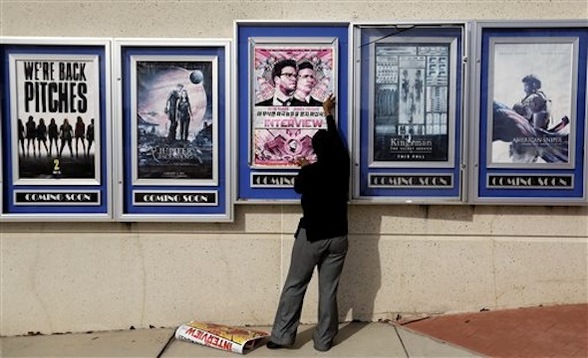Sign up for the daily CJR newsletter.
 Interview over A movie poster for “The Interview” is taken from a theater display case in Atlanta. (AP Photo/David Goldman)
Interview over A movie poster for “The Interview” is taken from a theater display case in Atlanta. (AP Photo/David Goldman)
Along with employee salaries, Channing Tatum’s penchant for all-caps, and executives’ racially charged jokes about President Obama, the Sony email hacks reveal the media ecosystem in illuminating detail. The communications, stolen by an anonymous individual or group, have been dissected everywhere from online tabloids to the most respected newspapers in the country, all of them ravenous actors in the same digital food chain — even if they don’t want to admit as much.
“Until now, the data has provided a feast for traffic-hungry websites like Fusion and those owned by Gawker Media, along with some mainstream news organizations like Bloomberg,” a Sunday New York Times story read. It didn’t mention that the Times has run several, if more nuanced, pieces on that same data. One — “Sony Hack Reveals Email Crossfire Over Angelina Jolie and Steve Jobs Movie” — garnered more than 3,000 social shares, according to Muck Rack analytics. That’s more than double what two separate frontpage stories from Wednesday have drawn.
“It would be a disservice to our readers to pretend these documents weren’t revealing and public,” Executive Editor Dean Bacquet said in a statement, adding that the Times would only report details that had broken elsewhere. “But the main issue, the main thing we consider, is how newsworthy the documents are.”
Padded with huge readerships, the Times and its peers may be able to survive without breaking news from the hacks — or even looking at them before they’ve been reported elsewhere. A number of outlets have narrowed their coverage to focus on the fallout of the theft, including ensuing threats from the anonymous hackers. Those warnings led Sony on Wednesday to cancel its Dec. 25 release of The Interview, a comedy poking fun at the North Korean regime.
But many news organizations, especially entertainment or digital-only outlets, are hungrier for the wandering eyeballs of internet readers. The Daily Beast is reportedly publishing its scoops under a fake byline in an apparent attempt to avoid backlash from the film industry. A number of quasi-apologetic articles and editor’s notes at other Web-only outlets have lamented the theft of Sony’s information. In the same breath, however, they’ve also conveyed the law of the digital jungle: eat or be eaten.
“The new reality is that journalists simply do not own the news cycle: Even if Gawker, BuzzFeed News, and Fusion decided to stop covering it, others would take up the mantle,” Anne Helen Petersen writes at BuzzFeed. “The new role of journalists, for better or for worse, isn’t as gatekeepers, but interpreters: If they don’t parse it, others without the experience, credentials, or mindfulness toward protecting personal information certainly will.”
Celebrities, Sony executives, and some commentators have disagreed with the underlying logic, of course. The studio’s lawyer, David Boies, sent a letter to news organizations on Sunday that warned of legal action for publishing information from the hacks, a dubious threat. Conceding that Slate had covered the communications “judiciously,” Jacob Weisberg, head of The Slate Group, argues that “there’s no ethical justification for publishing this damaging, stolen material.” Screenwriter Aaron Sorkin, fresh off a stint tutoring viewers on how media outlets should operate in “The Newsroom,” called publication “morally treasonous and spectacularly dishonorable” in an online column for The New York Times. Ryan Holiday went one step further at the New York Observer, urging readers to “do their part to limit the market for these stories.”
But there’s the rub: People want to read how producer Scott Rudin called Angelina Jolie “a minimally talented spoiled brat.” The Hollywood PR machine has raised many stars to the level of cultural demi-gods. The appetite for proof of their humanity has driven more than three weeks of coverage from bottom feeders, industry leaders, and every type of news organization in between. That’s not to defend the journalistic ethics of publishing backroom name-calling and other unimportant, though juicy, details. But this ongoing stream of coverage illustrates the sheer consumer demand to peer behind the curtain.
“Every reporter has fantasized about stumbling upon a treasure trove of secret documents,” writes Andrew Wallenstein, co-editor in chief of Variety. “So when a story such as Sony is spread in front of us in all its unprecedented scope, it’s instinctive for us to pounce. But this time around, acting on that reflex just doesn’t feel right…even though it isn’t wrong.”
Some of the hacks’ revelations are indeed newsworthy, as the Times’ Margaret Sullivan and Poynter’s Kelly McBride have noted. What’s more, the overall body of coverage will remain a glaring reminder that no digital information is entirely safe. News organizations that choose to add to it have a duty to do so as responsibly as they can. At The Verge, that meant putting three reporters on a story about how the film industry is battling Google in its push to crack down on online piracy.
“So this is the horse we’ve chosen in this race, and the editorial staff at The Verge stands by our decision…” entertainment editor Emily Yoshida wrote in a note accompanying the story. “We think it’s valuable to our readers and anyone who plans to spend any time on the internet in the future. We are all also very aware that had we waited a couple more hours, it would probably no longer be our horse. We’d reblog it, though. Chaos reigns.”
Has America ever needed a media defender more than now? Help us by joining CJR today.






